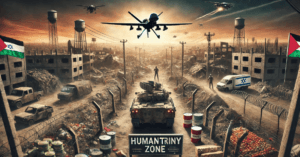Israel’s Shocking Gaza Plan: Full Military Takeover and Food Control?
Israel has drafted plans for a full military occupation of Gaza, aiming to take control within months and establish military rule. The plan includes relocating Gaza’s 2.2 million residents to a smaller “humanitarian zone” with restricted food distribution. Israel recently ended a ceasefire, resuming airstrikes that have raised the death toll past 50,000. Some experts argue occupation is necessary to eliminate Hamas, while others warn it could be long-term and unpopular. Israel also plans to encourage Palestinian emigration, which many see as psychological warfare.
The Defense Minister has threatened to annex parts of Gaza if hostages aren’t released. Internationally, the U.S. remains neutral, urging Hamas to surrender. Netanyahu’s decision to escalate war faces backlash from exhausted Israeli reservists and protestors. Critics argue the war is now about political survival rather than security. The situation raises concerns about Gaza’s future and potential long-term consequences.

Israel’s Shocking Gaza Plan: Full Military Takeover and Food Control?
The Israeli military has drafted plans for a large-scale ground invasion of Gaza, aiming to take full control and establish military rule. While these plans were presented to Israel’s Security Cabinet, it remains unclear whether they will be executed or if they serve as leverage to pressure Hamas into releasing more hostages.
Israel recently ended a two-month ceasefire and resumed heavy airstrikes. According to Gaza health officials, the death toll has now surpassed 50,000. If occupation proceeds, Gaza’s 2.2 million residents would be confined to a smaller designated “humanitarian zone,” where the military would oversee food distribution, limiting supplies to a basic survival level.
Experts are divided on the strategy. Some believe a full occupation is necessary to dismantle Hamas, while others warn that it could become a prolonged, unpopular engagement. Former U.S. official Dan Shapiro cautioned that without a clear governance plan, Israel risks being drawn into an extended occupation, further endangering hostages.
In addition, Israel’s government has approved a plan to encourage Palestinian emigration from Gaza, calling it a voluntary process. However, many Palestinians see this as psychological warfare, aimed at creating uncertainty and fear about their future.
Within Israel, the debate over Gaza’s future continues. Some defense officials argue that military control is essential, while others advocate for international collaboration to establish a new Palestinian leadership. Meanwhile, Israel’s Defense Minister has suggested permanently annexing parts of Gaza if Hamas does not release hostages, a move critics view as politically motivated rather than security-driven.
On the international stage, the U.S. has maintained a neutral stance, stating that Hamas could end the violence by surrendering and freeing hostages. However, analysts note that Israeli Prime Minister Benjamin Netanyahu’s renewed military actions may not align with public sentiment, as many Israelis prioritize hostage recovery over prolonged conflict.
As the war escalates, Israel’s military reservists—worn out from extended deployments—are beginning to resist further service. Protests have also erupted over Netanyahu’s domestic policies, including judicial reforms that critics claim undermine democracy. Some reservists now argue that the war is less about security and more about Netanyahu’s political survival.
With no clear resolution in sight, the humanitarian toll continues to grow, raising urgent questions about Gaza’s future and the possibility of lasting peace between Israelis and Palestinians. The devastation has left countless families displaced, infrastructure in ruins, and basic necessities in short supply. As international pressure mounts for a diplomatic solution, tensions remain high, and uncertainty looms over what comes next. Without a comprehensive strategy for post-war governance, the cycle of violence and suffering may persist, making peace an increasingly distant goal.
You must be logged in to post a comment.